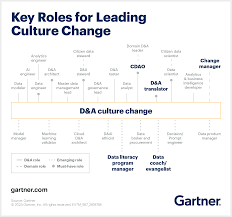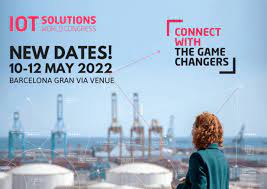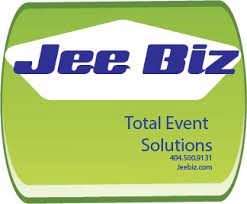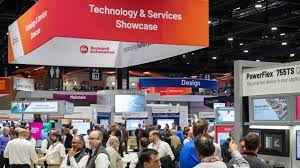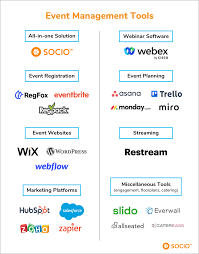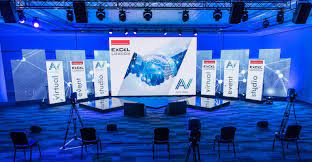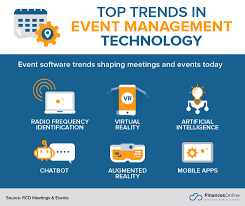Event Marketing Solutions: Taking Your Events to the Next Level
In today’s fast-paced and competitive business landscape, effective marketing is crucial for success. One powerful tool that businesses are increasingly leveraging is event marketing. Whether it’s a trade show, conference, product launch, or corporate event, strategic event marketing can help you connect with your target audience and leave a lasting impression.
However, planning and executing successful events can be a daunting task. That’s where event marketing solutions come into play. These comprehensive services provide businesses with the expertise and resources needed to create impactful events that drive results.
One of the key advantages of event marketing solutions is their ability to handle every aspect of your event – from initial planning to post-event analysis. They have a team of professionals who specialize in various areas such as event strategy, logistics, branding, design, promotion, and more. By entrusting your event to these experts, you can focus on your core business while knowing that every detail will be taken care of.
Event marketing solutions also offer invaluable guidance in developing a well-defined event strategy. They work closely with you to understand your goals and objectives, target audience, budget constraints, and desired outcomes. Based on this information, they create a tailored plan that aligns with your brand identity and ensures maximum impact.
Moreover, these solutions have extensive networks and relationships within the industry. This enables them to secure prime venues at competitive rates, negotiate contracts with suppliers and vendors for cost-effective solutions, and tap into their pool of contacts for potential sponsors or partners.
When it comes to promotion and attendee engagement, event marketing solutions employ various digital tools and strategies. They utilize social media platforms to generate buzz before the event and keep attendees engaged during the entire experience. Additionally, they may leverage email campaigns, content marketing techniques like blogs or videos related to the event theme or topic, targeted advertising campaigns across multiple channels – all aimed at maximizing attendance and creating excitement around your event.
During the event itself, these solutions ensure smooth operations and a seamless attendee experience. From registration and check-in processes to audiovisual setups, they handle all logistical aspects, allowing you to focus on delivering your message and connecting with your audience. They can also provide on-site support staff, ensuring that any issues or concerns are promptly addressed.
After the event, event marketing solutions conduct comprehensive evaluations to measure the success of your event against predefined metrics. They analyze attendee feedback, track key performance indicators (KPIs), and provide you with insightful reports that help you assess the impact of your event and identify areas for improvement in future endeavors.
In conclusion, event marketing solutions offer a comprehensive approach to planning and executing successful events. By leveraging their expertise, businesses can save time, reduce stress, and achieve greater results. Whether you’re a small startup or an established corporation, investing in professional event marketing solutions can take your events to the next level and ensure that your brand stands out in a crowded marketplace.
8 Advantages of Event Marketing Solutions for Your Business
- Increased brand awareness
- Improved customer engagement
- Increased sales
- Cost-effective
- Targeted audience reach
- Enhanced customer experience
- Generates leads
- Establishes relationships
Challenges of Event Marketing Solutions: Cost, Time, Audience Reach, and ROI Measurement
- It Can Be Costly
- It Requires Time and Dedication
- It May Not Reach Your Target Audience
- It Can Be Difficult to Measure ROI
Increased brand awareness
Increased Brand Awareness: Unlocking New Opportunities through Event Marketing Solutions
In today’s competitive business landscape, building brand awareness is crucial for success. One significant advantage of event marketing solutions is their ability to increase the visibility of your brand and create new opportunities for it to be seen by potential customers.
Events provide a unique platform for businesses to showcase their products, services, and values in a tangible and immersive way. By partnering with event marketing solutions, you can leverage their expertise in creating impactful experiences that resonate with your target audience.
These solutions work closely with you to understand your brand identity, messaging, and objectives. They then craft an event strategy that aligns with your brand’s essence and effectively communicates your value proposition to attendees.
Through well-planned events, you can capture the attention of a diverse audience who may not have been exposed to your brand otherwise. Whether it’s a trade show attended by industry professionals or a public exhibition attracting consumers, events allow you to engage directly with potential customers in a meaningful way.
Event marketing solutions employ various tactics to maximize brand exposure during events. They design visually appealing booths or displays that reflect your brand aesthetics and catch the eye of attendees. They also utilize creative signage, banners, and promotional materials strategically placed throughout the venue to reinforce your brand message.
Furthermore, these solutions often leverage digital tools and social media platforms before, during, and after the event to amplify your brand reach. They create buzz through pre-event promotions on social media channels such as Facebook, LinkedIn, Instagram, or Twitter. Live updates during the event keep followers engaged while generating curiosity among those who couldn’t attend. Post-event content highlights key moments and encourages further engagement from attendees and online audiences alike.
By increasing the visibility of your brand at events through effective marketing strategies, you open doors to new opportunities. Potential customers who were previously unaware of your offerings may discover them firsthand at an event. Positive experiences at these events can lead to increased brand recognition, word-of-mouth referrals, and even new partnerships or collaborations.
In conclusion, event marketing solutions play a crucial role in increasing brand awareness. They help you create memorable experiences that captivate audiences and leave a lasting impression. By leveraging their expertise in event planning and marketing, you can unlock new opportunities for your brand to be seen by potential customers, ultimately driving business growth and success.
Improved customer engagement
Improved Customer Engagement: Strengthening Connections through Event Marketing Solutions
In today’s digital age, where virtual interactions dominate, there is immense value in face-to-face connections. This is where event marketing solutions truly shine, offering a remarkable opportunity for businesses to engage with their customers on a personal level.
One significant advantage of event marketing solutions is the ability to foster improved customer engagement. Events provide a unique platform for businesses to interact directly with their customers, enabling them to forge deeper and more meaningful connections. In-person interactions allow for genuine conversations, active listening, and the opportunity to address customer concerns or questions in real-time.
By engaging with customers at events, businesses can create a memorable experience that goes beyond traditional marketing efforts. The personal touch offered by face-to-face interactions helps build trust and rapport with customers. It allows them to experience your brand firsthand, understand your values, and develop an emotional connection that can lead to long-term loyalty.
Events also provide an excellent avenue for showcasing products or services in an interactive and immersive manner. Whether through product demonstrations, workshops, or experiential activities, customers have the opportunity to see and experience the value your offerings bring firsthand. This hands-on approach not only helps customers better understand your products but also increases their confidence in making purchasing decisions.
Furthermore, events offer a platform for gathering valuable feedback from customers. By engaging in direct conversations during events, businesses can gain insights into customer preferences, pain points, and suggestions for improvement. This information proves invaluable when refining products or services to better meet customer needs.
The enhanced customer engagement facilitated by event marketing solutions also extends beyond the event itself. Through various follow-up strategies such as personalized emails or social media campaigns post-event, businesses can continue nurturing relationships with attendees. By staying connected and providing ongoing value after the event concludes, companies can further solidify customer loyalty and satisfaction.
In conclusion, improved customer engagement is a compelling pro of utilizing event marketing solutions. The opportunity to interact with customers in person fosters stronger connections, builds trust, and creates memorable experiences. By leveraging events as a platform for engagement, businesses can enhance customer loyalty, satisfaction, and ultimately drive long-term success.
Increased sales
Boosting Sales: How Event Marketing Solutions Drive Revenue Growth
When it comes to promoting products or services, businesses are constantly seeking innovative strategies to drive sales and generate revenue. One highly effective solution that has proven its worth time and time again is event marketing. By utilizing event marketing solutions, businesses can significantly increase their sales and revenue while creating a memorable brand experience for attendees.
Events provide a unique opportunity for businesses to showcase their offerings in an engaging and interactive environment. Whether it’s a product launch, a trade show booth, or a corporate event, events allow potential customers to see, touch, and experience the value of your products or services firsthand. This immersive experience creates a lasting impression on attendees and increases the likelihood of converting them into loyal customers.
Event marketing solutions play a crucial role in maximizing the sales potential of events. These solutions employ various strategies to ensure that your products or services are effectively promoted throughout the event lifecycle. They work closely with you to understand your target audience and develop tailored messaging that resonates with their needs and desires.
Attracting qualified leads is another key aspect of event marketing solutions. They assist in driving attendance by implementing targeted promotional campaigns across multiple channels such as social media, email marketing, and digital advertising. By reaching the right audience with compelling messages, these solutions ensure that your event attracts individuals who are genuinely interested in your offerings, increasing the chances of converting them into paying customers.
During the event itself, event marketing solutions create an environment conducive to sales conversions. They design visually appealing booths or displays that grab attention and effectively communicate your brand’s value proposition. With well-trained staff who possess deep product knowledge, they engage with attendees, answer questions, overcome objections, and ultimately guide them towards making purchasing decisions.
Furthermore, these solutions often incorporate lead capture mechanisms into their strategies. Whether through interactive activities at the booth or digital tools such as QR codes or mobile apps, they capture valuable customer data that can be used for post-event follow-ups and nurturing leads into sales.
Post-event follow-up is a critical component of event marketing solutions. They help you develop a comprehensive plan to engage with attendees after the event, keeping your brand top of mind and nurturing relationships. This may include personalized emails, targeted offers or discounts, or even exclusive events for attendees to further deepen their connection with your brand and drive sales conversions.
By leveraging event marketing solutions, businesses can tap into the immense potential of events as a powerful sales-driving tool. The ability to showcase products or services in a tangible way, attract qualified leads, create engaging experiences, and implement effective post-event follow-ups all contribute to increased sales and revenue growth.
In today’s competitive marketplace, it’s essential to explore innovative strategies that can give your business an edge. Event marketing solutions offer precisely that – a proven method to boost sales while leaving a lasting impact on your target audience. So why wait? Start harnessing the power of events to drive revenue growth and take your business to new heights.
Cost-effective
Cost-effective: The Advantages of Event Marketing Solutions
When it comes to promoting your business or brand, cost is always a factor to consider. Traditional advertising methods like print or television ads can be costly and may not always yield the desired results. This is where event marketing solutions shine, offering a cost-effective alternative that delivers impactful results.
Event marketing solutions provide businesses with a unique opportunity to engage directly with their target audience at a fraction of the cost of traditional advertising. By hosting events such as trade shows, conferences, or product launches, businesses can showcase their products or services in an interactive and engaging manner.
Compared to other forms of advertising, event marketing solutions offer several advantages in terms of cost-effectiveness. First and foremost, the cost per impression is significantly lower. With traditional advertising methods, you pay for each individual impression, whether it’s through printed materials or television airtime. In contrast, event marketing allows you to reach a large number of potential customers at once without incurring additional costs per attendee.
Additionally, event marketing solutions provide opportunities for strategic partnerships and sponsorships. By partnering with other businesses or securing sponsors for your events, you can offset some of the costs associated with organizing and executing the event. Sponsors often contribute financially or provide goods and services in exchange for exposure and branding opportunities during the event. This collaborative approach allows businesses to stretch their budgets while still delivering impactful experiences for attendees.
Another aspect that makes event marketing solutions cost-effective is their ability to target specific audiences effectively. With traditional advertising methods, reaching a highly targeted audience can be challenging and expensive. However, events allow you to tailor your messaging directly to your intended audience. By focusing on individuals who have shown interest in attending specific events related to your industry or niche, you can maximize the return on investment by connecting with potential customers who are more likely to convert into loyal clients.
Furthermore, event marketing solutions often incorporate digital strategies that amplify reach while minimizing costs. Utilizing social media platforms, email campaigns, and online registration systems, businesses can promote their events to a wider audience at a fraction of the cost of traditional advertising channels. These digital tools not only help generate buzz before the event but also allow for ongoing engagement and interaction with attendees during and after the event.
In conclusion, event marketing solutions offer a cost-effective approach to promoting your business or brand. By providing opportunities for direct engagement with your target audience, strategic partnerships, and leveraging digital tools, these solutions allow you to optimize your marketing budget while achieving impactful results. So if you’re looking for a cost-effective way to reach potential customers and create memorable experiences, consider investing in event marketing solutions as part of your overall marketing strategy.
Targeted audience reach
Targeted Audience Reach: Reaching the Right People with Event Marketing Solutions
In the vast sea of marketing strategies, one standout advantage of event marketing solutions is their ability to target specific audiences. This targeted approach allows businesses to connect with individuals who are most likely interested in their products or services, maximizing the impact and return on investment.
Unlike traditional advertising methods that cast a wide net and hope for the best, event marketing solutions enable businesses to tailor their events to attract a specific demographic or niche market. By understanding your target audience’s preferences, behaviors, and interests, these solutions can create an event experience that resonates with them on a deeper level.
The beauty of targeted audience reach is that it minimizes wasted resources. Instead of spending time, money, and effort on reaching people who may not have any interest in what you offer, event marketing solutions ensure that your message reaches those who are most likely to engage with your brand. This not only increases the chances of converting attendees into customers but also enhances brand loyalty as you connect with individuals who genuinely appreciate what you have to offer.
Moreover, by aligning your event with your target audience’s interests and needs, you create a more personalized experience. This personalization fosters stronger connections between your brand and potential customers. It allows you to showcase how your products or services can solve their pain points or fulfill their desires directly, making your offerings more compelling and relevant.
Event marketing solutions utilize various strategies to reach targeted audiences effectively. They employ data-driven techniques such as customer segmentation and analysis to identify specific demographics or market segments that align with your business objectives. By leveraging this information, they can craft tailored promotional campaigns that resonate with these audiences across multiple channels.
Additionally, event marketing solutions often have access to extensive databases or networks within specific industries or communities. They can tap into these resources to attract attendees who are already interested in topics related to your products or services. This ensures that you’re not just reaching a random crowd but engaging with individuals who have a genuine interest in what you have to offer.
By targeting the right audience, event marketing solutions help businesses maximize their event’s impact and achieve higher conversion rates. They bring together like-minded individuals who share common interests or needs, creating an environment where networking, knowledge sharing, and potential partnerships can thrive.
In conclusion, the ability to reach a targeted audience is a significant pro of event marketing solutions. By focusing your efforts on those most likely to be interested in your products or services, you can create a highly personalized and impactful event experience. This targeted approach not only increases the chances of converting attendees into customers but also helps build stronger brand connections and loyalty. With event marketing solutions, you can ensure that your message reaches the right people at the right time, driving meaningful results for your business.
Enhanced customer experience
Enhanced Customer Experience: The Power of Event Marketing Solutions
In today’s digital age, where everything seems to be just a click away, businesses are constantly searching for ways to stand out and create meaningful connections with their customers. One powerful pro of event marketing solutions is their ability to enhance the customer experience, leaving a lasting impression that keeps attendees coming back for more.
Events provide a unique opportunity to engage with customers in a way that cannot be replicated through other marketing channels. Whether it’s a product launch, industry conference, or brand activation, events offer an immersive experience that captivates attendees and leaves them with unforgettable memories.
By utilizing event marketing solutions, businesses can create an environment tailored to their brand and target audience. From the moment attendees step foot into the venue, they are greeted with carefully curated visuals, interactive displays, and engaging activities that reflect the essence of the brand. This immersive experience allows customers to connect with the brand on a deeper level, forging an emotional connection that goes beyond traditional advertising methods.
Moreover, events provide a platform for face-to-face interactions between businesses and their customers. Attendees have the opportunity to engage in meaningful conversations with company representatives or industry experts, ask questions, provide feedback, and share their experiences. This personalized interaction builds trust and loyalty among customers as they feel valued and heard.
The interactive nature of events also allows businesses to showcase their products or services in action. Attendees can witness firsthand how a product works or experience a service demonstration. This hands-on approach not only helps customers understand the value proposition but also instills confidence in their purchasing decisions.
Furthermore, events often offer exclusive perks or incentives for attendees such as discounts, giveaways, or access to limited edition products. These special offerings create a sense of exclusivity and reward for customers who took the time to attend the event. By providing these unique benefits, businesses can strengthen customer loyalty and encourage repeat business.
The memorable impression created through event marketing solutions has a ripple effect beyond the event itself. Attendees are likely to share their positive experiences with friends, family, and colleagues, generating word-of-mouth marketing that can significantly impact brand awareness and reputation. This organic promotion can lead to new customer acquisition and further expand the customer base.
In conclusion, enhanced customer experience is a significant pro of event marketing solutions. By creating unique and immersive experiences, businesses can leave a lasting impression on attendees, fostering loyalty and increasing the likelihood of future engagement. Events provide an opportunity for face-to-face interactions, product demonstrations, and exclusive perks that build trust and strengthen relationships with customers. Investing in event marketing solutions is an effective way to differentiate your brand and create memorable experiences that keep customers coming back for more.
Generates leads
Event Marketing Solutions: Generating Qualified Leads for Business Growth
In the ever-evolving world of marketing, businesses are constantly on the lookout for effective strategies to generate leads and drive growth. One standout advantage of event marketing solutions is their ability to generate qualified leads that may be challenging to acquire through other means, such as online advertising or cold calling campaigns.
Events provide a unique platform for businesses to connect with their target audience in a more personal and engaging manner. Whether it’s a trade show, conference, or industry-specific event, attendees are often actively seeking information and solutions related to their needs and interests. This presents an ideal opportunity for businesses to showcase their products or services and capture the attention of potential customers who are already interested in what they have to offer.
Event marketing solutions excel at leveraging this opportunity by strategically positioning your brand within the event space. They work closely with you to understand your target audience and develop tailored messaging that resonates with their needs and pain points. By effectively communicating your value proposition, these solutions help attract qualified leads who are genuinely interested in what your business has to offer.
Moreover, events allow for face-to-face interactions, which can significantly enhance lead generation efforts. Attendees have the chance to engage directly with your team members, ask questions, and gain a deeper understanding of your offerings. This level of personal interaction helps build trust and credibility – two essential factors in converting leads into loyal customers.
Event marketing solutions also employ various tactics during events to capture lead information efficiently. They may set up interactive booths or stations where attendees can provide their contact details in exchange for valuable resources or experiences. These can include anything from exclusive whitepapers or e-books related to their interests, product demos, or even exciting giveaways that create buzz around your brand.
Once lead information is collected, event marketing solutions ensure proper follow-up procedures are in place. They have sophisticated lead management systems that enable timely communication with prospects after the event concludes. This includes sending personalized emails, making follow-up calls, or even scheduling meetings to further nurture the relationship and move leads through the sales funnel.
By generating qualified leads through events, businesses can significantly enhance their sales pipeline and accelerate growth. These leads have already demonstrated interest in your products or services by attending the event and engaging with your brand. As a result, they are more likely to convert into paying customers compared to leads acquired through traditional marketing methods.
In conclusion, event marketing solutions offer a powerful advantage by generating qualified leads that may be challenging to acquire through other means. By strategically positioning your brand at events and leveraging face-to-face interactions, these solutions help attract and engage potential customers who are genuinely interested in what you have to offer. With their expertise in lead capture and follow-up procedures, event marketing solutions can help businesses unlock new growth opportunities and drive success in today’s competitive marketplace.
Establishes relationships
Establishes Relationships: Event Marketing Solutions and the Power of Face-to-Face Interaction
In today’s digital age, building meaningful relationships with potential clients can be a challenge. However, event marketing solutions offer a powerful advantage by providing face-to-face interaction and networking opportunities at events. This pro of event marketing solutions is invaluable for establishing genuine connections that can lead to long-term business relationships.
While online communication has its benefits, nothing compares to the personal touch and authenticity that comes from meeting someone in person. Events provide a platform where businesses and attendees can engage directly, fostering real-time conversations, exchanging ideas, and building rapport.
Event marketing solutions understand the importance of these face-to-face interactions and create environments that facilitate meaningful connections. By carefully designing event layouts, incorporating networking sessions, or organizing interactive activities, they ensure that attendees have ample opportunities to engage with each other and with your brand.
These interactions allow you to showcase your products or services in a more personalized manner. You can demonstrate your expertise, answer questions directly, and address any concerns or doubts in real-time. This level of engagement builds trust and credibility while giving potential clients a firsthand experience of what your brand has to offer.
Moreover, events often attract industry professionals, influencers, and thought leaders who can serve as valuable contacts for your business. With event marketing solutions guiding you through the process, you have access to an extensive network of attendees who may become potential clients or partners.
Networking opportunities provided by event marketing solutions go beyond just exchanging business cards. They foster an environment where genuine connections are made. These connections may result in collaborations, referrals, or even long-term partnerships that can significantly benefit your business growth.
Additionally, attending events through event marketing solutions allows you to stay updated on industry trends and gain insights from experts in your field. This knowledge-sharing environment not only enhances your own expertise but also positions you as an authority figure within your industry.
In conclusion, one of the significant advantages of event marketing solutions is their ability to establish relationships through face-to-face interaction. By providing opportunities for genuine connections and networking, these solutions allow businesses to build trust, credibility, and long-term partnerships with potential clients. In a digital world where personal connections are often overlooked, event marketing solutions bring the power of human interaction back into the spotlight and help businesses thrive through meaningful relationships.
It Can Be Costly
It Can Be Costly: Evaluating the Investment in Event Marketing Solutions
While event marketing solutions offer a range of benefits, it’s important to consider the potential drawbacks as well. One notable con is the cost associated with these services. Implementing an effective event marketing strategy often requires a significant upfront investment, which can be a deterrent for businesses operating on tight budgets.
Event marketing solutions encompass various expenses, including event planning and management fees, venue rentals, promotional materials, audiovisual equipment, staffing, and more. These costs can quickly add up and strain financial resources, particularly for small or emerging businesses that may have limited funds allocated for marketing initiatives.
For some businesses, the high price tag of event marketing solutions can be prohibitive and may require careful consideration before committing to such an investment. It’s essential to evaluate whether the potential returns and long-term benefits of hosting an event outweigh the initial costs.
However, it is worth noting that while event marketing solutions can be expensive, they also offer opportunities for significant returns on investment. Well-executed events have the potential to generate brand awareness, attract new customers or clients, foster valuable industry connections, and even drive direct sales. By carefully assessing your business goals and aligning them with the intended outcomes of your event marketing strategy, you can determine if the potential benefits justify the financial commitment.
To mitigate costs without compromising on quality or impact, businesses can explore alternative options within their budget constraints. This may involve scaling down the size or scope of the event while still maintaining its effectiveness. For example, instead of hosting a large-scale conference at an expensive venue, consider organizing a more intimate gathering at a cost-effective location or exploring virtual event options that require less overhead.
Additionally, it’s essential to thoroughly research different event marketing solution providers and compare their pricing structures and services. Some companies may offer flexible packages tailored to different budgets or provide customizable options that allow businesses to prioritize specific aspects of their events according to their financial capabilities.
Ultimately, the decision to invest in event marketing solutions should be based on a careful assessment of your business’s financial situation, marketing objectives, and long-term growth plans. While cost is a valid concern, it’s crucial to weigh it against the potential benefits and returns that a well-executed event can bring. By considering all aspects and exploring cost-effective alternatives, businesses can make informed decisions about their event marketing strategies and find the right balance between investment and outcomes.
It Requires Time and Dedication
The Time and Resource Challenge of Event Marketing Solutions
While event marketing solutions offer numerous benefits, it’s important to acknowledge that they come with their fair share of challenges. One significant drawback is the amount of time and dedication required to set up, manage, and execute events effectively. This can pose difficulties, particularly for smaller companies with limited staff or resources.
Planning and executing a successful event involves a multitude of tasks, including venue selection, logistics coordination, branding and design, promotion, attendee engagement strategies, and post-event analysis. Each of these aspects requires careful attention and meticulous execution to ensure a seamless experience for attendees and achieve desired outcomes.
For smaller companies that may already have limited human resources or stretched budgets, allocating the necessary time and manpower to handle all aspects of event marketing can be a daunting task. It may require diverting valuable personnel away from their primary responsibilities or hiring additional staff solely dedicated to event management. Both options can strain resources and impact overall productivity.
Furthermore, managing events demands a high level of expertise in various areas such as event strategy development, marketing techniques, vendor negotiations, technology integration, and more. Smaller companies may not have access to professionals with specialized knowledge in these domains or the financial means to outsource these services from event marketing solutions providers.
However, it’s essential to note that while resource constraints may present challenges for smaller companies in implementing event marketing solutions independently, there are alternative approaches available. Collaborating with external event management agencies or seeking partnerships with experienced professionals can help alleviate some of the burdens associated with planning and executing events.
By leveraging the expertise of external partners who specialize in event marketing solutions, smaller companies can tap into their knowledge base without having to invest heavily in building an internal team from scratch. These partnerships allow for shared responsibilities where businesses can focus on their core competencies while relying on experienced professionals for event-related tasks.
In conclusion, while the time and dedication required for successful event marketing solutions can be a con, it’s important to explore alternative approaches for smaller companies. By seeking external partnerships or collaborating with event management agencies, businesses can overcome resource limitations and still benefit from the advantages of event marketing solutions. With careful planning and strategic decision-making, even companies with limited staff or resources can create impactful events that contribute to their overall marketing objectives.
It May Not Reach Your Target Audience
The Con of Event Marketing Solutions: Potential Audience Reach Limitations
While event marketing solutions offer numerous benefits, it’s important to acknowledge that one potential drawback is the possibility of not reaching your target audience effectively. Depending on the nature of your event and its appeal to your specific audience, there may be challenges in attracting their attention or providing sufficient incentives for them to attend or participate.
Events vary greatly in terms of their target audience and appeal. If you’re hosting an industry-specific conference or trade show, for instance, it may be easier to attract professionals within that specific field. However, if your event is more general or doesn’t have a clear niche focus, it might be more challenging to capture the interest of your intended audience.
Another factor to consider is the saturation of events in certain industries or geographic locations. If there are multiple events happening simultaneously within the same niche, potential attendees may have to choose between them based on factors like reputation, relevance, or convenience. In such cases, event marketing solutions need to employ innovative strategies and strong value propositions to stand out from the competition and entice attendees.
Furthermore, even if your event does reach your target audience, there’s no guarantee that it will provide enough incentive for them to attend or participate. People have busy schedules and limited time available for attending events. To overcome this challenge, event marketing solutions must emphasize the unique value proposition of your event and clearly communicate how attending will benefit participants professionally or personally.
To mitigate these limitations, thorough market research becomes crucial. Understanding your target audience’s preferences, interests, and motivations will help you tailor your event marketing strategy effectively. By identifying their pain points and aligning your event offerings with their needs and desires, you can increase the chances of attracting a receptive audience.
Additionally, leveraging various promotional channels can help expand your reach beyond traditional methods. Utilizing social media platforms with targeted advertising campaigns can help you reach specific demographics more effectively. Collaborating with influential individuals or organizations in your industry can also amplify your event’s visibility and attract a wider audience.
In conclusion, while event marketing solutions offer numerous advantages, it’s essential to acknowledge the potential limitations regarding audience reach. By understanding your target audience, conducting thorough market research, and employing innovative promotional strategies, you can maximize the chances of successfully reaching and engaging your intended attendees.
It Can Be Difficult to Measure ROI
The Conundrum of Measuring ROI in Event Marketing Solutions
Event marketing solutions undoubtedly offer a plethora of benefits for businesses looking to make an impact through events. However, one significant challenge that often arises is the difficulty in measuring the return on investment (ROI) accurately. Without proper tracking mechanisms in place, it becomes challenging to determine if an event marketing solution is truly worth the cost and effort involved.
Measuring ROI is crucial for any marketing initiative, as it helps businesses assess the effectiveness and profitability of their strategies. Unfortunately, when it comes to events, quantifying the direct impact can be elusive. Unlike digital marketing campaigns where clicks, conversions, and other metrics can be easily tracked, events involve a more complex web of interactions and outcomes.
One of the primary reasons measuring ROI in event marketing solutions can be challenging is the multiple touchpoints involved throughout the event lifecycle. From pre-event promotion to on-site engagement and post-event follow-up, there are numerous opportunities for attendees to interact with your brand. Determining which specific touchpoints contributed most significantly to conversions or sales becomes a convoluted task without robust tracking systems.
Furthermore, attributing revenue directly to event participation can be intricate. Attendees may not make immediate purchasing decisions during or immediately after an event. Instead, they might engage with your brand over time before converting into paying customers. This delayed conversion timeline makes it difficult to attribute revenue solely to the event itself.
Another obstacle lies in accurately quantifying intangible benefits such as brand awareness and reputation enhancement that events often provide. While these outcomes are undoubtedly valuable for long-term business growth, assigning a concrete monetary value becomes subjective and challenging.
To address these measurement challenges, businesses must implement robust tracking mechanisms and data analytics tools throughout their event marketing initiatives. Utilizing technologies like RFID badges or mobile apps can help capture attendee behavior data during events, providing insights into engagement levels and preferences. Additionally, integrating CRM systems with event registration platforms can help track post-event conversions and customer journeys.
Moreover, businesses should establish clear and measurable event goals from the outset. By defining specific objectives, such as lead generation or product sales, and aligning them with key performance indicators (KPIs), it becomes easier to evaluate the success of an event marketing solution against predetermined benchmarks.
While measuring ROI in event marketing solutions may present challenges, it is not an insurmountable obstacle. By implementing comprehensive tracking mechanisms, setting clear goals, and utilizing data analytics tools effectively, businesses can gain valuable insights into the impact of their events on their bottom line. With a strategic approach to measurement, businesses can make informed decisions about the worthiness of their investment in event marketing solutions.

